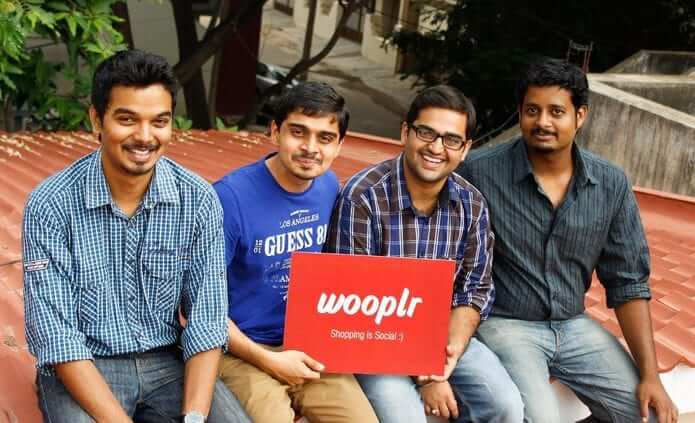(Pictured: Far Right, Arjun Zacharia & other co-founders)
Arjun Zacharia completed his Computer Engineering undergraduate degree from NIT, Surathkal , among the top 10 Engineering colleges in India, in 2004 and worked in companies like Intel, McAfee, Integral and Tavant for close to 8 years before starting Wooplr. Wooplr is Arjun’s second stint as an entrepreneur. Before starting Wooplr, Arjun co-founded auto404.org – a grievance redressal portal for traffic violations in Bangalore impact startup , along with two of the other Wooplr co-founders. He has been a tinkerer all his life – science projects in school, starting a higher education and social awareness club in his undergrad college, implementing marketing strategies for a micro-finance startup and finally starting Wooplr. Curiosity to know how things work and how they can be improved has made Arjun who he is today, and the actions he has taken that has brought Arjun to his current state. Arjun tells us more about his story as an entrepreneur and his work at Wooplr.
What exactly is Wooplr?
Wooplr is a social shopping platform where people discover and share things to buy from local stores around them.
How did you come up with the idea of Wooplr?
Wooplr was born out of our own pain points – what to buy and from where? Everyone around us was looking for such information. We wanted people to find out what others were buying instead of what the stores are selling. We didn’t find it, so we built it.
Could you walk us through the process of starting up Wooplr?
It is once in a lifetime that you get a team, which believes in an idea. Such a thing happened when I was working in McAfee – I got three of my colleagues interested in working on ideas, which would later shape into Wooplr.
Once we had the team, we got down to making a prototype of Wooplr, rolling it out quickly to the target audience and taking feedback. We realized that being a social product we would only get one chance. So we rolled out the prototype in private beta and that too in one city only – Bangalore.
Once we had the MVP ready, we launched public beta this year mar 8th 2013 and have since then expanded to Mumbai and Delhi.
How has it been like managing the business since?
A startup is always a time and resource constrained environment. That makes running the business quite dynamic, hectic and fun. For us the mantra has been – correct and continue. Over the past 6 months, we have grown a fine team, expanded to new cities and enjoyed every single day at work.
Did you find anything particularly difficult during the startup?
There are very few pointers when it comes to building a user community around a social product. Especially in India, where hardly any social products have made mark locally or scaled globally.
We personally met the first 500 users who used Wooplr – took feedback, improvised on features. This also helped us understand the nuances of building a vibrant user community around the product.
How was the initial reaction from the consumers?
The first reaction was – is Wooplr made in India? They loved the concept and were curious to know how it works and how to use Wooplr. Capturing mind space in this era of multiple apps is a challenge and the first iteration of our product did not have much utility other than clicking and sharing your shopping finds. So, user traction was less. So we took feedback and rolled out more features, removed the unnecessary ones and came up with a product which people found more useful and started using in larger numbers.
Do you face a lot of competition in this industry?
We have a few competitors in the social local commerce space. Most haven’t managed to connect with the users and gain traction. And frankly, there is no entry barrier when it comes to most internet startups. Our only strategy is to keep building an awesome user community around Wooplr and keep creating more utility for the user to use Wooplr.
What can you tell us about the industry?
The social local commerce space is pretty much in the nascent stage. Even in countries like US, UK there are a few companies emerging and gaining traction. That said the “Offline-Online connect” space is gaining considerable attention from the business and VC community.
The major insight is that inspite of the internet commerce booming, offline commerce is and will remain a major part of our shopping lives. Even more important is the emergence of the “omni-channel” shopper – the same shopper might buy online and offline from the same business. The experience and credibility built on one platform can boost the sales on the other. This is exactly the one place Wooplr fits in, becoming the online-offline digital connect between businesses and users.
How have you managed to stay relevant in this industry?
By listening to the user and businesses – understanding what they need and build relevant features
What are your future plans for Wooplr?
The long-term plan of Wooplr is to bring local commerce to the mobile. Also, the concept of Wooplr appeals to a shopper in Bangalore as much as in Boston ; so we want to take this global.
If you could start all over again, would you change anything about your approach?
We would take the mobile first approach. When we launched Wooplr, we first built the product on the web and then focused on the app.
What do you think about startups in Asia?
I am better positioned to answer about startups in India. Past few years have seen good startups coming up backed by good talent. This is just the beginning. As we see more success stories, more people will be willing to leave their comfortable jobs and plunge into startups. This is just the beginning.
What are some personal principles or personal values that guide you and your career?
Lead by example. Respect to all, be it the CEO or peon of a company.
What is your definition of success?
The satisfaction of having brought a change in whatever you are focused on.
Why did you decide to become an entrepreneur?
Curiosity. This lead me to question many a things I saw around me. I didn’t find the answers, so decided to build them.
What do you think are the most important things entrepreneurs should keep in mind?
Be Shameless in what you pursue as long as it doesn’t hurt anyone; there’s no room for ego when you are building a startup. A united team will always move faster.
In your opinion, what are the keys to entrepreneurial success?
Though it is too early for me to comment, I would say Perseverance is the most important key to success.
Any parting words of wisdom for entrepreneurs out there?
Just hang in there my friends, tomorrow brings in a new ray of hope, opportunities to grab and remember – enjoy the journey!
Connect
Website: www.wooplr.com
Facebook: www.facebook.com/wooplr
Twitter: www.twitter.com/wooplr
Blog: blog.wooplr.com
Linkedin: http://www.linkedin.com/in/arjunabrahamzacharia































